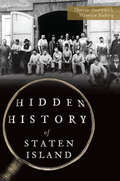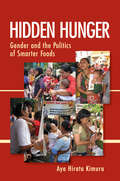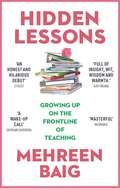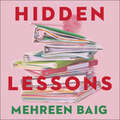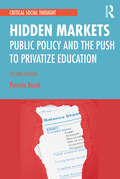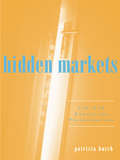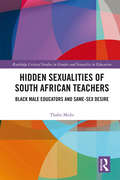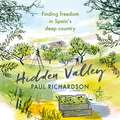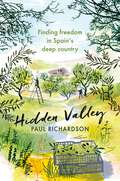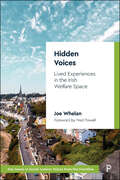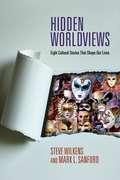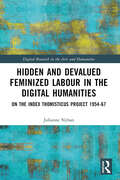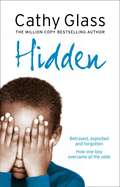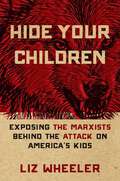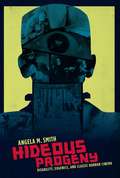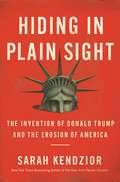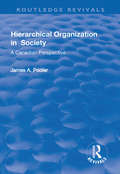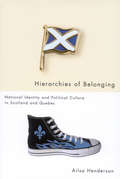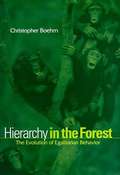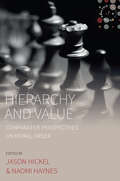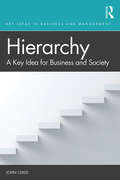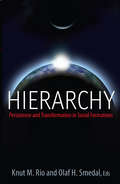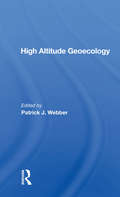- Table View
- List View
Hidden History of Staten Island (Hidden History)
by Maureen Seaberg Theresa AnarumoTake the ferry to this New York City borough and discover its colorful secrets, in a quirky history packed with facts and photos. Staten Island has a rich and fascinating cultural legacy that few people outside New York City's greenest borough know about. Chewing gum was invented on the island with the help of Mexican general Antonio López de Santa Anna. Country music legend Roy Clark got his start as a virtuoso guitar player on the Staten Island Ferry. Anna Leonowens, who worked with the king's children in the Court of Siam and was the basis for The King and I, came back to Staten Island to write about her experiences and run a school for children. Join native Staten Islanders Theresa Anarumo and Maureen Seaberg as they document the hidden history of the borough with these stories, and many more
Hidden Hunger: Gender and the Politics of Smarter Foods
by Aya Hirata KimuraFor decades, NGOs targeting world hunger focused on ensuring that adequate quantities of food were being sent to those in need. In the 1990s, the international food policy community turned its focus to the "hidden hunger" of micronutrient deficiencies, a problem that resulted in two scientific solutions: fortification, the addition of nutrients to processed foods, and biofortification, the modification of crops to produce more nutritious yields. This hidden hunger was presented as a scientific problem to be solved by "experts" and scientifically engineered smart foods rather than through local knowledge, which was deemed unscientific and, hence, irrelevant. In Hidden Hunger, Aya Hirata Kimura explores this recent emphasis on micronutrients and smart foods within the international development community and, in particular, how the voices of women were silenced despite their expertise in food purchasing and preparation. Kimura grounds her analysis in case studies of attempts to enrich and market three basic foods-rice, wheat flour, and baby food-in Indonesia. She shows the power of nutritionism and how its technical focus enhanced the power of corporations as a government partner while restricting public participation in the making of policy for public health and food. She also analyzes the role of advertising to promote fortified foodstuffs and traces the history of Golden Rice, a crop genetically engineered to alleviate vitamin A deficiencies. Situating the recent turn to smart food in Indonesia and elsewhere as part of a long history of technical attempts to solve the Third World food problem, Kimura deftly analyzes the intersection of scientific expertise, market forces, and gendered knowledge to illuminate how hidden hunger ultimately defined women as victims rather than as active agents.
Hidden Lessons: Growing Up on the Frontline of Teaching
by Mehreen Baig'Beautifully written, Hidden Lessons is both a heart-rending account of the challenges in our education system, and a heart-warming celebration of teachers and students who have triumphed through adversity. The pride Mehreen has for her community and the lives she has touched is palpable.' - DAVID LAMMY~~~~~~~~~~~~You're in at 7am, there until 7pm and marking into the late hours. You've got one student who's a full time carer, another who's pregnant, and a third who's just joined a gang. You haven't got enough textbooks to go around, and one of the parents just called you an 'extremist'. You've just gone through a devastating heartbreak and you have to teach Romeo and Juliet to 30 hormonal 14 year olds.Welcome to life as a teacher.This is a world that all of us know, but most of us have completely forgotten. It's a world where you're working 50 hour weeks, but you're still just a part-time teacher because the rest of the time you're a security guard, a nurse, a counsellor, or a friend. It's also a world where you spend all day with some of the most interesting people you know. And even when the lesson plan has been abandoned, you're still learning.Mehreen started teaching at 21, and by the time she left 10 years later she'd learnt a bit about teenagers and a lot about life. This is her story.
Hidden Lessons: Growing Up on the Frontline of Teaching
by Mehreen Baig'Beautifully written, Hidden Lessons is both a heart-rending account of the challenges in our education system, and a heart-warming celebration of teachers and students who have triumphed through adversity. The pride Mehreen has for her community and the lives she has touched is palpable.' - DAVID LAMMY~~~~~~~~~~~~You're in at 7am, there until 7pm and marking into the late hours. You've got one student who's a full time carer, another who's pregnant, and a third who's just joined a gang. You haven't got enough textbooks to go around, and one of the parents just called you an 'extremist'. You've just gone through a devastating heartbreak and you have to teach Romeo and Juliet to 30 hormonal 14 year olds.Welcome to life as a teacher.This is a world that all of us know, but most of us have completely forgotten. It's a world where you're working 50 hour weeks, but you're still just a part-time teacher because the rest of the time you're a security guard, a nurse, a counsellor, or a friend. It's also a world where you spend all day with some of the most interesting people you know. And even when the lesson plan has been abandoned, you're still learning.Mehreen started teaching at 21, and by the time she left 10 years later she'd learnt a bit about teenagers and a lot about life. This is her story.
Hidden Lessons: Growing Up on the Frontline of Teaching
by Mehreen BaigHilarious and heart-warming and utterly compelling, Hidden Lessons lets you in on the life secrets all teachers know.You're in at 7am, there until 7pm and marking into the late hours. You've got one student who's a full time carer, another who's pregnant, and a third who's just joined a gang. You haven't got enough textbooks to go around, and one of the parents just called you an 'extremist'. You've just gone through a devastating heartbreak and you have to teach Romeo and Juliet to 30 hormonal 14 year olds. Welcome to life as a teacher.This is a world that all of us know, but most of us have completely forgotten. It's a world where you're working 50 hour weeks, but you're still just a part-time teacher because the rest of the time you're a security guard, a nurse, a counsellor, or a friend. It's also a world where you spend all day with some of the most interesting people you know. And even when the lesson plan has been abandoned, you're still learning. Mehreen started teaching at 21, and by the time she left 10 years later she'd learnt a bit about teenagers and a lot about life. This is her story.(P) 2021 Hodder & Stoughton Limited
Hidden Markets: Public Policy and the Push to Privatize Education (Critical Social Thought)
by Patricia BurchAcross the United States, test publishers, software companies, and research firms continue to take advantage of the revenues made available by federal policies like the No Child Left Behind Act, Race to the Top, and the Elementary and Secondary Education Act. In effect, the education industry has assumed a central place in the day-to-day governance and administration of public schools—a previously hidden trend that has begun to be a ubiquitous component of public education. Drawing on analytic tools, Hidden Markets examines specific domains that the education industry has had particular influence on—home schooling, remedial instruction, management consulting, test development, data management, and staff development. With updated and new material added, this second edition also highlights how technology and technology policy shape the conditions for teachers’ work, the role of natural disasters as education market opportunities, and the connection between racism and educational privatization. Burch's analysis demonstrates that only when we subject the education industry to systematic and in-depth critical analysis can we begin to demand more corporate accountability and organize to halt the slide of education funds into the market. Additional updates include: Discussion of the role that policy elites play in allowing CEOS to regulate the student identity market Examination of the rise of online tutoring engineered in part by the No Child Left Behind Act New chapter that offers an updated road map for policymakers and activists concerned about the issues raised within the book
Hidden Markets: The New Education Privatization (Critical Social Thought)
by Patricia BurchAcross the U.S., test publishers, software companies, and research firms are swarming to take advantage of the revenues made available by the No Child Left Behind Act. In effect, the education industry has assumed a central place in the day-to-day governance and administration of public schools—a trend that has gone largely unnoticed by policymakers or the press until now. Drawing on analytic tools, Hidden Markets examines specific domains that the education industry has had particular influence on—home schooling, remedial instruction, management consulting, test development, data management, and staff development. Burch's analysis demonstrates that only when we subject the education industry to systematic and in-depth critical analysis can we begin to demand more corporate accountability and organize to halt the slide of education funds into the market.
Hidden Sexualities of South African Teachers: Black Male Educators and Same-sex Desire (Routledge Critical Studies in Gender and Sexuality in Education)
by Thabo MsibiSouth Africa remains a global leader in the legislative protection of individuals who engage in same-sex relations, and is the only country in Africa where the rights of these individuals are explicitly recognized and protected by the constitution. Yet South Africa’s identities are still contested and evolving, particularly for same-sex desiring teachers – many are forced to locate their sexualities privately for fear of being ostracized, bullied or losing their jobs, resulting in the miseducation of young people in schools. This volume reveals the various ways in which black South African male teachers construct their sexual and professional identities, how they accommodate structural dictates while simultaneously resisting them, and the effect this has on students. Presenting the day-to-day experiences of eight same-sex desiring teachers within repressive contexts, this volume challenges the Western origins and assumptions of queer theory, particularly its inability to confront communal forms of social organizing and its focus on individual agency. It asks for more socially responsive theorizing that takes into account the role played by location, race, class, gender and sexual identification within South African and international contexts.
Hidden Valley: Finding freedom in Spain's deep country
by Paul RichardsonThe story of the real 'good life' of an off-grid existence in rural SpainPaul Richardson fled the city to live on the land in a rough-and-tumble village on the edge of Europe. Immersing himself in the culture of his remote Spanish community, he learned the traditional arts of animal husbandry and vegetable growing, wine-making and home distilling, and made bread from the rye he sowed on the stone-walled terraces of his twelve-acre farm. In prose that shimmers with wit and sensuality, the author charts his personal route-map along a road less travelled - from urban pressures to rural tranquility, and from insecurity to fulfilment. Along the way he pays tribute to the influences that have shaped his progress - from The Good Life to Henry David Thoreau, from the 1970s pioneers to self-sufficiency to his farming neighbours in the far-flung region of Extremadura. In Richardson's hands, off-grid living both becomes an act of rebellion and a heartening proof that a simpler, better life is possible, if only we can remove ourselves from the ethos in which conspicuous consumption is a duty and success/failure the wheel on which society turns. Hidden Valley is a glorious narrative of one man's journey towards self-reliance. Original and thought-provoking, it is also hugely entertaining.
Hidden Valley: Finding freedom in Spain's deep country
by Paul RichardsonThe story of the real 'good life' of an off-grid existence in rural SpainPaul Richardson fled the city to live on the land in a rough-and-tumble village on the edge of Europe. Immersing himself in the culture of his remote Spanish community, he learned the traditional arts of animal husbandry and vegetable growing, wine-making and home distilling, and made bread from the rye he sowed on the stone-walled terraces of his twelve-acre farm. In prose that shimmers with wit and sensuality, the author charts his personal route-map along a road less travelled - from urban pressures to rural tranquility, and from insecurity to fulfilment. Along the way he pays tribute to the influences that have shaped his progress - from The Good Life to Henry David Thoreau, from the 1970s pioneers to self-sufficiency to his farming neighbours in the far-flung region of Extremadura. In Richardson's hands, off-grid living both becomes an act of rebellion and a heartening proof that a simpler, better life is possible, if only we can remove ourselves from the ethos in which conspicuous consumption is a duty and success/failure the wheel on which society turns. Hidden Valley is a glorious narrative of one man's journey towards self-reliance. Original and thought-provoking, it is also hugely entertaining.
Hidden Voices: Lived Experiences in the Irish Welfare Space (Key Issues in Social Justice)
by Joe WhelanUnderpinned by the idea of the right to a ‘basic minimum’, welfare states are a major feature of many societies. However, the lived experiences of persons seeking and receiving welfare payments can often be overlooked. This book seeks to remedy this omission by honouring lived experience as valuable, insightful and necessary. It draws on qualitative interviews with 19 people receiving various working age welfare payments in Ireland to explore stigma, social reciprocity and the notions of the deserving and undeserving poor, and to analyse welfare conditionality in the Irish context. Breaking new ground, this book offers original research findings which contest and inform policy both within Ireland and beyond.
Hidden Worldviews: Eight Cultural Stories That Shape Our Lives
by Steve Wilkens Mark L. SanfordWhy do we buy what we buy, vote the way we vote, eat what we eat and say what we say? Why do we have the friends we have, and work and play as we do? It's our choice? Yes, but there are forces, often unseen, that shape every decision we make and every action we take. These hidden, life-shaping values and ideas are not promoted through organized religions or rival philosophies but fostered by cultural habits, lifestyles and the institutional structures of society. Steve Wilkens and Mark Sanford shine a spotlight on the profound challenges to Christianity and faithful Christian living that come from worldviews that comprise the cultural soup we swim in. The authors show how to detect the individualism, consumerism, nationalism, moral relativism, scientific naturalism, New Age thinking, postmodern tribalism and salvation as therapy that fly under our radar. Building on the work of worldview thinkers like James Sire, this book helps those committed to the gospel story recognize those rival cultural stories that compete for our hearts and minds.
Hidden and Devalued Feminized Labour in the Digital Humanities: On the Index Thomisticus Project 1954-67 (Digital Research in the Arts and Humanities)
by Julianne NyhanHidden and Devalued Feminized Labour in the Digital Humanities examines the data-driven labour that underpinned the Index Thomisticus–a preeminent project of the incunabular digital humanities–and advanced the data-foundations of computing in the Humanities. Through oral history and archival research, Nyhan reveals a hidden history of the entanglements of gender in the intellectual and technical work of the early digital humanities. Setting feminized keypunching in its historical contexts–from the history of concordance making, to the feminization of the office and humanities computing–this book delivers new insight into the categories of work deemed meritorious of acknowledgement and attribution and, thus, how knowledge and expertise was defined in and by this field. Focalizing the overlooked yet significant data-driven labour of lesser-known individuals, this book challenges exclusionary readings of the history of computing in the Humanities. Contributing to ongoing conversations about the need for alternative genealogies of computing, this book is also relevant to current debates about diversity and representation in the Academy and the wider computing sector. Hidden and Devalued Feminized Labour in the Digital Humanities will be of interest to researchers and students studying digital humanities, library and information science, the history of computing, oral history, the history of the humanities, and the sociology of knowledge and science.
Hidden: Betrayed, Exploited And Forgotten - How One Boy Overcame The Odds
by Cathy GlassFrom the Sunday Times and New York Times bestselling author comes the poignant and shocking memoir of Cathy s recent relationship with Tayo, a young boy she fosters whose good behaviour and polite manners hide a terrible past. Tayo arrives at Cathy s with only the clothes he stands up in. He has been brought to her by the police, but he is calm, polite, and very well spoken, and not at all like the children she normally fosters. The social worker gives Cathy the forms which should contain Tayo s history, but apart from his name and age, it is blank. Tayo has no past. Tayo is an 'invisible' child, kidnapped from his loving father in Nigeria and brought illegally to the UK by his drink and drugs dependent prostitute mother, where he is put to work in a sweat shop in Central London. When he sustains an injury and is no longer earning, he is cast out. When Cathy takes Tayo to school he points out a dozen different addresses where he has stayed in the last six months, often being left alone. Tayo lies, and manipulates situations to his own advantage and Cathy has to be continually on guard. Tayo s social worker searches all computer databases but there is no record of Tayo he has only attended school for 3 terms and has never seen a doctor. He and his mother have been evading the authorities by living underground . With his mother recently released from prison, Tayo is desperate to live with his father in Nigeria, but no one can track him down or even prove that he exists. "
Hide Your Children: Exposing the Marxists Behind the Attack on America's Kids
by Liz WheelerHaving conquered all the major institutions of our culture, the left is closing in on its final frontier—your children. In this new book, Liz Wheeler exposes where the forces of wokeness are at work and explains how parents can fight back for a change. Everything is on the line.Despite the occasional victory, conservatives are on the defensive on every front of the culture wars, especially America&’s schools. Planned Parenthood is funding gender theory indoctrination, groomer teachers are introducing youngsters to pornography, Disney executives are bragging about their &“queerness agenda,&” and teacher&’s unions are poisoning young minds with racism. If someone doesn&’t stand up and fight, these ideas will be the norm for a new generation. A distressing number of parents refuse to see how depraved our schools have become. The next generation will determine the fate of the American experiment in ordered liberty. Will they pass it on to their children, or will we lose our nation forever? Parents and their allies must go on the offensive in this existential fight. Fortunately, they have the truth on their side. It is not too late.
Hideous Progeny: Disability, Eugenics, and Classic Horror Cinema (Film and Culture Series)
by Angela SmithTwisted bodies, deformed faces, aberrant behavior, and abnormal desires characterized the hideous creatures of classic Hollywood horror, which thrilled audiences with their sheer grotesqueness. Most critics have interpreted these traits as symptoms of sexual repression or as metaphors for other kinds of marginalized identities, yet Angela M. Smith conducts a richer investigation into the period's social and cultural preoccupations. She finds instead a fascination with eugenics and physical and cognitive debility in the narrative and spectacle of classic 1930s horror, heightened by the viewer's desire for visions of vulnerability and transformation. Reading such films as Dracula (1931), Frankenstein (1931), Dr. Jekyll and Mr. Hyde (1931), Freaks (1932), and Mad Love (1935) against early-twentieth-century disability discourse and propaganda on racial and biological purity, Smith showcases classic horror's dependence on the narratives of eugenics and physiognomics. She also notes the genre's conflicted and often contradictory visualizations. Smith ultimately locates an indictment of biological determinism in filmmakers' visceral treatments, which take the impossibility of racial improvement and bodily perfection to sensationalistic heights. Playing up the artifice and conventions of disabled monsters, filmmakers exploited the fears and yearnings of their audience, accentuating both the perversity of the medical and scientific gaze and the debilitating experience of watching horror. Classic horror films therefore encourage empathy with the disabled monster, offering captive viewers an unsettling encounter with their own impairment. Smith's work profoundly advances cinema and disability studies, in addition to general histories concerning the construction of social and political attitudes toward the Other.
Hiding In Plain Sight: The Invention Of Donald Trump And The Erosion Of America
by Sarah KendziorThe story of Donald Trump’s rise to power is the story of a buried American history – buried because people in power liked it that way. It was visible without being seen, influential without being named, ubiquitous without being overt. <p><p> Sarah Kendzior’s Hiding in Plain Sight pulls back the veil on a history spanning decades, a history of an American autocrat in the making. In doing so, she reveals the inherent fragility of American democracy – how our continual loss of freedom, the rise of consolidated corruption, and the secrets behind a burgeoning autocratic United States have been hiding in plain sight for decades. <p> In Kendzior’s signature and celebrated style, she expertly outlines Trump’s meteoric rise from the 1980s until today, interlinking key moments of his life with the degradation of the American political system and the continual erosion of our civil liberties by foreign powers. Kendzior also offers a never-before-seen look at her lifelong tendency to be in the wrong place at the wrong time – living in New York through 9/11 and in St. Louis during the Ferguson uprising, and researching media and authoritarianism when Trump emerged using the same tactics as the post-Soviet dictatorships she had long studied. <p> It is a terrible feeling to sense a threat coming, but it is worse when we let apathy, doubt, and fear prevent us from preparing ourselves. Hiding in Plain Sight confronts the injustice we have too long ignored because the truth is the only way forward.
Hierarchical Organization in Society
by James A PoolerThis title was first publiished in 2000: A hierarchy is an organization system that is structured in a treelike manner, with levels of status or authority stacked one above the other. The classical and best known example of a hierarchy is probably the typical diagram that describes the structure of a company or business, also known as the corporate ladder. This text argues that hierarchies are one of the most important concepts we have in order to understand the world around us, and looks at hierarchies in a wide variety of areas of interest to everybody, such as companies, educational systems, transport systems, retail stores, corporations, communities, population migrations, medical systems, and many other real-world phenomena. From a Canadian perspective, the text examines these hierarchies and their effects at a variety of scales. It discusses how to understand the system around us and the ones in which we are immersed every day. The central theme is that it is possible to get a better grip on the past, present and future of the world, if it is viewed through an understanding of hierarchies.
Hierarchies of Belonging
by Ailsa HendersonAilsa Henderson analyses each nation's linguistic, racial, cultural, economic, and political diversity within a historical and contemporary context. Challenging the assumption that nationalism in Scotland can be characterized as "civic" in contrast to an "ethnic" model in Quebec, Henderson adopts a more complex model of national identity that distinguishes between nationalistic rhetoric, which is invariably civic in form, and public understandings of belonging, which tend to rely on ethnic markers. In Hierarchies of Belonging she demonstrates that nationalist rhetoric and a sense of belonging affect how citizens feel about the state, the nation, and each other.
Hierarchy In The Forest: The Evolution Of Egalitarian Behavior
by Christopher BoehmAre humans by nature hierarchical or egalitarian? Hierarchy in the Forest addresses this question by examining the evolutionary origins of social and political behavior. Christopher Boehm, an anthropologist whose fieldwork has focused on the political arrangements of human and nonhuman primate groups, postulates that egalitarianism is in effect a hierarchy in which the weak combine forces to dominate the strong. The political flexibility of our species is formidable: we can be quite egalitarian, we can be quite despotic. Hierarchy in the Forest traces the roots of these contradictory traits in chimpanzee, bonobo, gorilla, and early human societies. Boehm looks at the loose group structures of hunter-gatherers, then at tribal segmentation, and finally at present-day governments to see how these conflicting tendencies are reflected. Hierarchy in the Forest claims new territory for biological anthropology and evolutionary biology by extending the domain of these sciences into a crucial aspect of human political and social behavior. This book will be a key document in the study of the evolutionary basis of genuine altruism. Table of Contents: The Question of Egalitarian Society Hierarchy and Equality Putting Down Aggressors Equality and Its Causes A Wider View of Egalitarianism The Hominoid Political Spectrum Ancestral Politics The Evolution of Egalitarian Society Paleolithic Politics and Natural Selection Ambivalence and Compromise in Human Nature References Index Reviews of this book: This well-written book, geared toward an audience with background in the behavioral and evolutionary sciences but accessible to a broad readership, raises two general questions: 'What is an egalitarian society?' and 'How have these societies evolved?'. . . [Christopher Boehm] takes the reader on a journey from the Arctic to the Americas, from Australia to Africa, in search of hunter-gatherer and tribal societies that emanate the egalitarian ethos--one that promotes generosity, altruism and sharing but forbids upstartism, aggression and egoism.
Hierarchy and Organisation: Toward a General Theory of Hierarchical Social Systems (Routledge Studies in Management, Organizations and Society #24)
by Thomas DiefenbachMost people take the conditions they work and live in as a given, believing it to be normal that societies are stratified and that organisations are hierarchical. Many even think that this is the way it should be - and are neither willing nor able to think that it could be otherwise. This book raises the awareness of hierarchy, its complexity and longevity. It focuses on a single but fundamental problem of social systems such as dyads, groups, organisations and whole societies: Why and how does hierarchical social order persist over time? In order to investigate the question, author Thomas Diefenbach develops a general theory of the persistence of hierarchical social order. This theory interrogates the problem of the persistence of hierarchical social order from very different angles, in multi-dimensional and interdisciplinary ways. Even more crucially, it traces the very causes of the phenomenon, the reasons and interests behind hierarchy as well as the various mechanisms which keep it going. This is the first time such a theory is attempted. With the help of the theory developed in this book, it is possible to interrogate systematically, comprehensively and in detail how mindsets and behaviours as well as societal and organisational structures enable the continuation of hierarchy
Hierarchy and Value: Comparative Perspectives on Moral Order (Studies in Social Analysis #7)
by Jason Hickel Naomi HaynesGlobalization promised to bring about a golden age of liberal individualism, breaking down hierarchies of kinship, caste, and gender around the world and freeing people to express their true, authentic agency. But in some places globalization has spurred the emergence of new forms of hierarchy—or the reemergence of old forms—as people try to reconstitute an imagined past of stable moral order. This is evident from the Islamic revival in the Middle East to visions of the 1950s family among conservatives in the United States. Why does this happen and how do we make sense of this phenomenon? Why do some communities see hierarchy as desireable? In this book, leading anthropologists draw on insightful ethnographic case studies from around the world to address these trends. Together, they develop a theory of hierarchy that treats it both as a relational form and a framework for organizing ideas about the social good.
Hierarchy: A Key Idea for Business and Society (Key Ideas in Business and Management)
by John ChildWritten by a world-renowned authority, Hierarchy takes readers on a journey which traverses how hierarchy has evolved, is understood in various disciplines, and is applied in practice. Referring a wide range of sources, the book provides an inspirational introduction to understanding what is perhaps the key idea in business and management. As a fundamental organizational principle, hierarchy is everywhere. Perhaps because of its ubiquity, the significance of hierarchy has become under-analyzed in view of the growing strains on society imposed by organizational inequality. This book analyzes the advantages and disadvantages that hierarchy brings as a form of organization, providing an accessible overview of this fundamental idea within both business and society. This concise book provides a useful overview of existing research, for both students and scholars of business.
Hierarchy: Persistence and Transformation in Social Formations
by Olaf H. Smedal Knut M. RioLouis Dumont's concept of hierarchy continues to inspire social scientists. Using it as their starting point, the contributors to this volume introduce both fresh empirical material and new theoretical considerations. On the basis of diverse ethnographic contexts in Oceania, Asia, and the Middle East they challenge some current conceptions of hierarchical formations and reassess former debates - of post-colonial and neo-colonial agendas, ideas of "democratization" and "globalization," and expanding market economies - both with regard to new theoretical issues and the new world situation.
High Altitude Geoecology
by Patrick J. WebberThis book is concerned with section 6 of the United Nations Educational, Scientific, and Cultural Organization (UNESCO) program, "Impact of Human Activities on Temperate and Tropical Mountain and Tundra Ecosystems."
